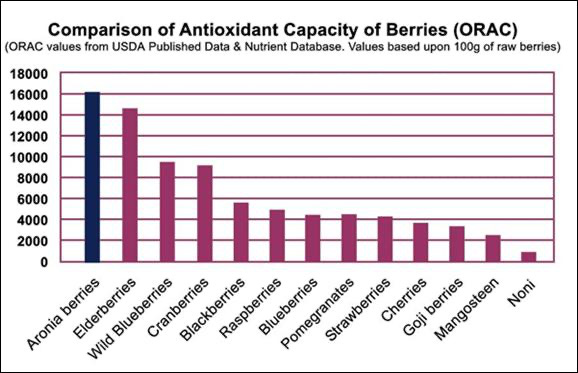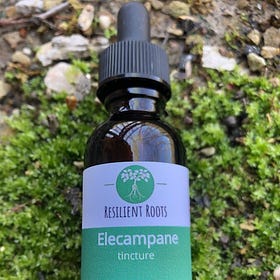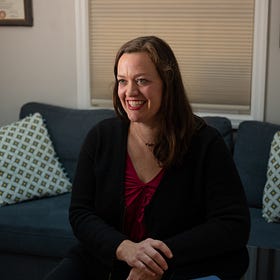The April Resilient Roots Report
Hey Herbies!
I hate to start the newsletter on a down note, but because my physical health is having such a big impact on my herbal work right now, I think it’s important to be honest about what’s up. I’m in the midst of a rough flare-up of back, hip, and sciatic pain that’s left me mostly unable to physically work with herbs and plants for the past month. I had big spring plans—medicine making, plant sales, workshops—but for now, a lot of that is on hold until I can walk without pain.
(Side note: if anyone is interested in trading herbs, consults, or supplements for garden help, please let me know! My native meadow area needs some love. Must be solid at invasive ID and ready to wrangle some Japanese honeysuckle and winter creeper.)
This setback has been hard, but I’m hopeful about healing and incredibly grateful to have a partner whose full-time job supports us with income and health insurance while I recover. I keep thinking: what happens to self-employed folks who are single and can’t work? Especially when something like this hits during the most vital time of year—spring planting season. With Medicaid and other public programs under threat, and our healthcare system already a mess, it’s deeply concerning, to say the least.
All of this makes me even more committed to continuing my community clinic work. While I haven’t been able to do much physically, I did recently host a medicine-making gathering in support of the Hemphill Community Center in Neon, where folks have been hit by flooding—again and again. Several amazing Berea-based herbalists and artists helped host a Wellness Day there last Saturday. I’ll share more on that in a post soon.
This health challenge has humbled me. It’s reminded me how isolating and brutal chronic pain can be. I feel that irritated sciatic nerve constantly, and the pain wears on my nervous system—I’m edgier, more easily overwhelmed, and struggling to focus. Tulsi, milky oats, and ashwagandha have been my go-tos for softening the edges and tending to my nervous system. (All three grow beautifully in Kentucky, by the way—now’s a great time to plant your oats!)
Even with all this, I’ve got some exciting plans in the works—and I’ll go ahead and share them in this newsletter, with hope that healing is on the way.
Thanks for reading and take care,
Lauren
Coming up
The Whippoorwill Festival is returning April 25-27 and the schedule is posted! I’m scheduled to teach Herbal Medicine Making, and some of my good herbal buddies are teaching as well - Leah Van Winkle is teaching about Thai Herbal Compresses and Melissa Calhoun is leading a plant walk. There are several other plant and health related workshops and lots of other things that you don’t want to miss!!
April schedule for Berea College Forest. Don’t miss the wildflowers at Anglin Falls!
I made plans for a series of women’s health workshops before I had this pain flare up, so I want to go ahead and tell you about it, but won’t open registration until I feel better. Women’s health is my educational area of specialization and my main clinical focus. I spend most of the winter in a perimenopause education deep dive, and I have lots to share!
Garden
I am happy to say that all the native perennials that I planted using the “winter sowing method” have germinated! That means I should have skullcap, blue vervain, cardinal flower, wood mint and a few other interesting and hard to find plants available for sale in mid Mayish. I also have elderberry cuttings, valerian, motherwort, and coneflower available for sale now - you can reply to this email if you want to buy some!
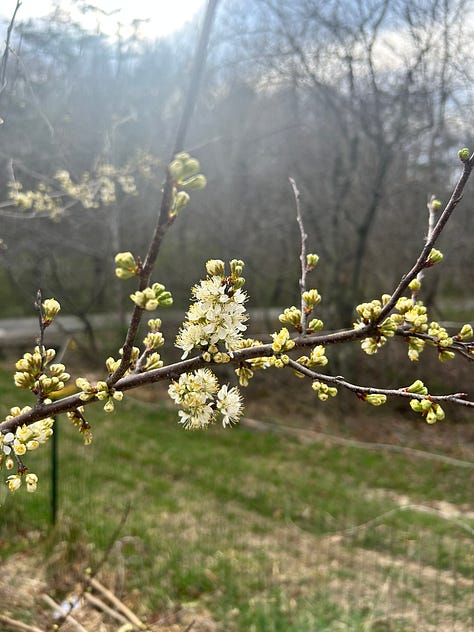
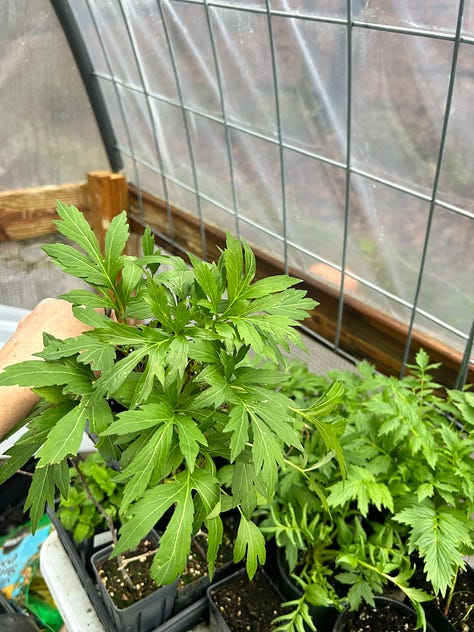
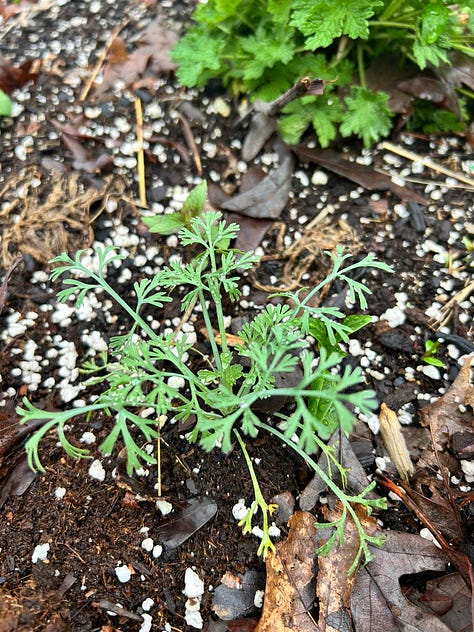
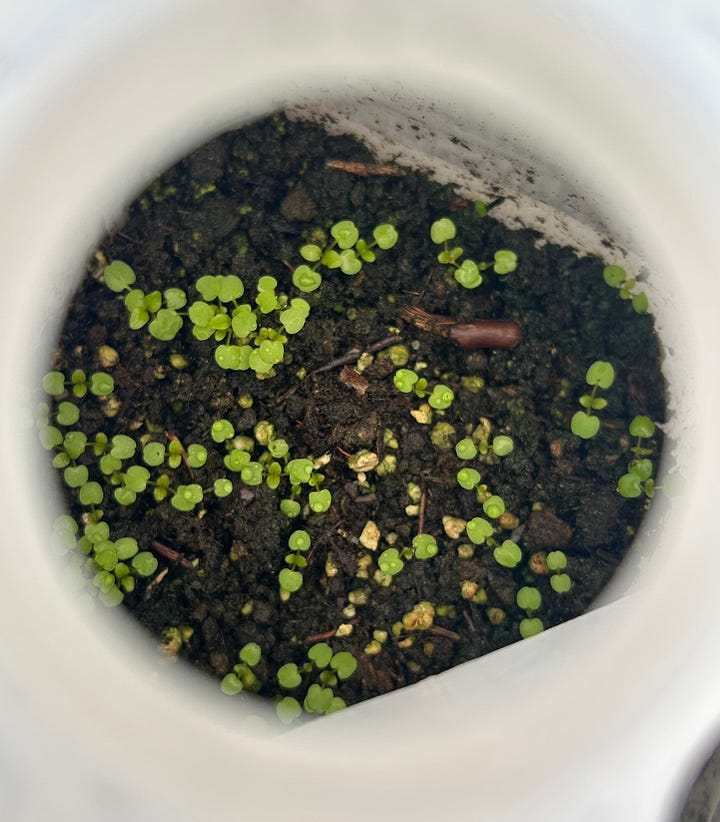
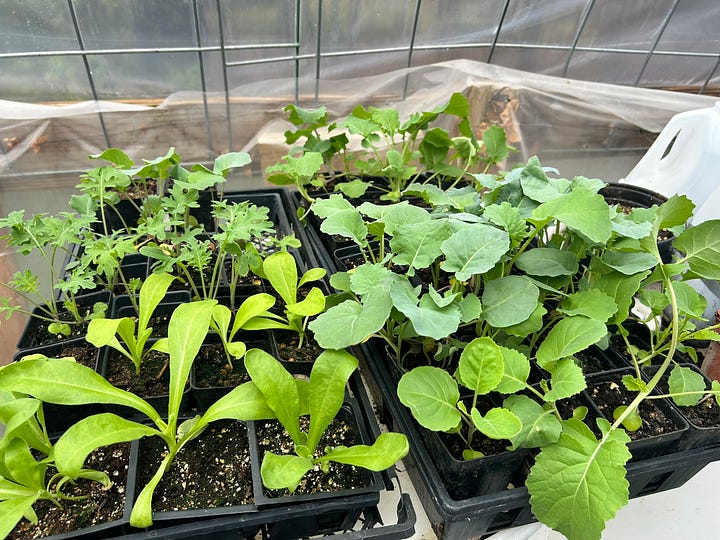
from L to R - plum tree blooms, green headed coneflower (sochan) transplants, California poppy, winter sown skullcap seedlings in the milk jug, greens and calendula that will soon be planted in the garden
Herbs
Registration has opened for the International Herb Symposium, which is in Cincinnati this year. That’s probably the closest we’re going to get to an international herb conference any time soon! I’m planning to attend.
Please consider growing and eating Aronia! Aronia melanocarpa is a native shrub that is also called “chokeberry” because its fruit is sour and astringent, causing some pucker in the mouth! It is in the rose family, and many plants in this family are known for their astringent qualities - rose petal, agrimony leaf, raspberry leaf, lady’s mantle, and many more!
Aronia has the highest amount of antioxidants as any fruit - check out this chart (source):
Needless to say, Aronia is a HIGHLY medicinal food, and has been studied with positive effects in humans for reducing cardiovascular disease markers, reducing inflammation, improving health after heart attack, lowering "bad" cholesterol, helping improve diabetes, and more!
Some of these research studies included a very small amount of berries ingested per day - as little as 3 berries may give noticeable health benefits! (you can review some of the studies here).
I hope this inspires you to plant an aronia berry in your yard, especially since it does well in wet areas where other plants might be more difficult to grow. My good friends at Sylvatica Forest Farm have it in stock!!
Reminders
Tinctures and glycerites for sale
hey y’all! I have so many beautiful herbs that I have grown and lovingly processed into tinctures and glycerites. Below is a short list of some of my most popular and frequently used herbs, but I have many more, so please contact me if you are looking for something in particular. I am also happy to make custom blends!
Consultations
Everyone can use herbs to improve health and well-being. I specialize in conditions involving women’s health, digestive health, stress/nervous system, and immune health.
Supplement orders
Support me instead of Amazon! By using Fullscript, we both win. You get a 20% discount (always), free shipping over $50, and I get a small portion of the sale.
Disclaimers and such:
Any health info on this page is given for general knowledge and awareness and should not be considered medical advice. I have to tell you to discuss herbal medicine with your doctor before taking it, even though most doctors don't know anything about it. Please also discuss herbs with a trained herbalist, especially if you are taking medications that have a narrow therapeutic window (for example, birth control pills) or have chronic health conditions.
Thanks for reading Resilient Roots! Subscribe for free to receive new posts and support my work.





